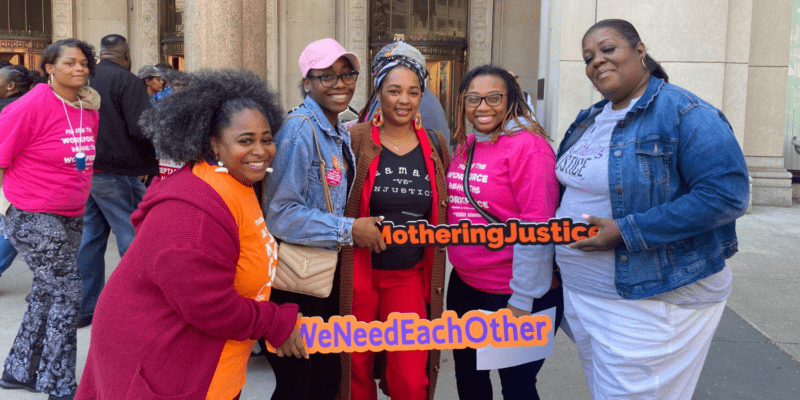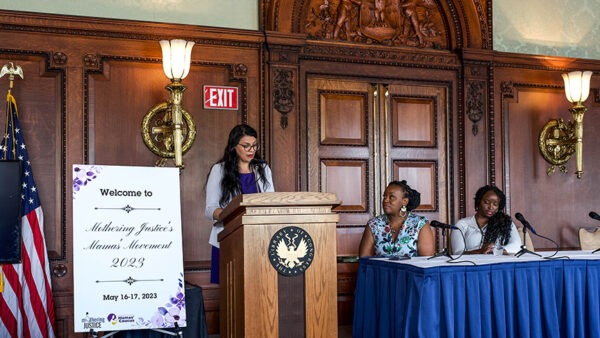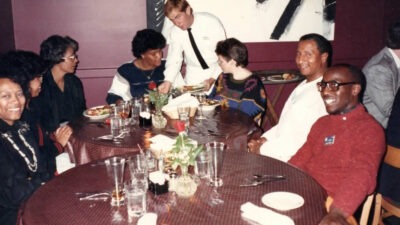Whether the experience involves an individual, organization or community, lasting transformation takes place from the inside out. For the next several weeks, we’re pulling lessons from our new Racial Equity Spotlight series. This set of three publications gives an insider’s view of a wide variety of WKKF grantee partners who are committed to transforming their internal practices and ways of being to strengthen their work in support of children and families.
In Brief
Mothering Justice, a Detroit-based grassroots policy advocacy organization founded in 2012, is dedicated to mobilizing mothers of color to influence policy on behalf of themselves and their families. With a focus on reproductive justice, affordable child care, basic needs security and time off to care, the organization strives to improve the quality of life for families.
As an organization led and staffed by Black mothers, Mothering Justice prioritizes resistance to white supremacy and living into the principles of racial equity, justice and authenticity – not only in their external work but also in their internal practices. Since its inception, the organization has engaged in ongoing conversations about what it means to be a women-of-color organization in a world where white supremacy is deeply entrenched. The journey for Mothering Justice staff members is rooted in constantly reflecting on the values they hold and working to stay true to them when the dominant paradigm for working mothers is not child- or family-centered.
Why This Matters
By aligning work structures and processes with the lived experiences of their staff, redefining expertise and prioritizing mental health, Mothering Justice demonstrates its commitment to living its values and creating a nurturing and fulfilling workplace.
Founder and national executive director Danielle Atkinson emphasizes the importance of trust and flexibility, stating, “Everyone is an expert in what they do. So, there doesn’t need to be this overbearing management structure. People are tasked with governing themselves and the pace of their work.” This approach reflects the world Mothering Justice wants to live in – a world in which the lived experiences of staff are recognized and accommodated so they can lean on their gifts and do their work without having their life responsibilities treated as barriers.
The organization also actively challenges predominant notions of qualification and expertise, recognizing how these have been largely influenced by white supremacist practices and structures. By creating clear paths for growth within the organization and “readying staff” for future positions, Mothering Justice values learning as part of the process of growing and embraces failure as a learning opportunity.
As Atkinson explains, “People of color, Black women in particular, do a lot of posturing to make up for a perceived knowledge gap. So, we try to make the space really welcoming and safe to say, ‘I don’t really know how to do this part of my job,’ because that’s the most important thing.”
The Opportunity
Mothering Justice’s transformational journey offers valuable insights and actionable steps for other organizations seeking to foster widespread change and promote racial equity:
- Lead from a space of authenticity that lifts up and honors staff members’ identities;
- Consistently interrogate how white supremacy manifests within organizational policies and structures;
- Identify and implement organizational policies that recognize and accommodate staff members’ lived experiences and contexts;
- Attend to the mental health and healing needs of staff in ways that encourage vulnerability and honest engagement;
- Intentionally create spaces for staff to engage in community with each other and offer opportunities to provide feedback to support healing and belonging.
By adopting these practices and embracing the benefits of internal transformation, organizations can enhance their ability to effectively serve children and families by creating a more equitable and just society. The journey may be challenging, but the long-term impact of diversifying staff, building their skill sets, supporting their leadership, and deepening the institutional wisdom of the organization makes the investment well worth the effort.










Comments